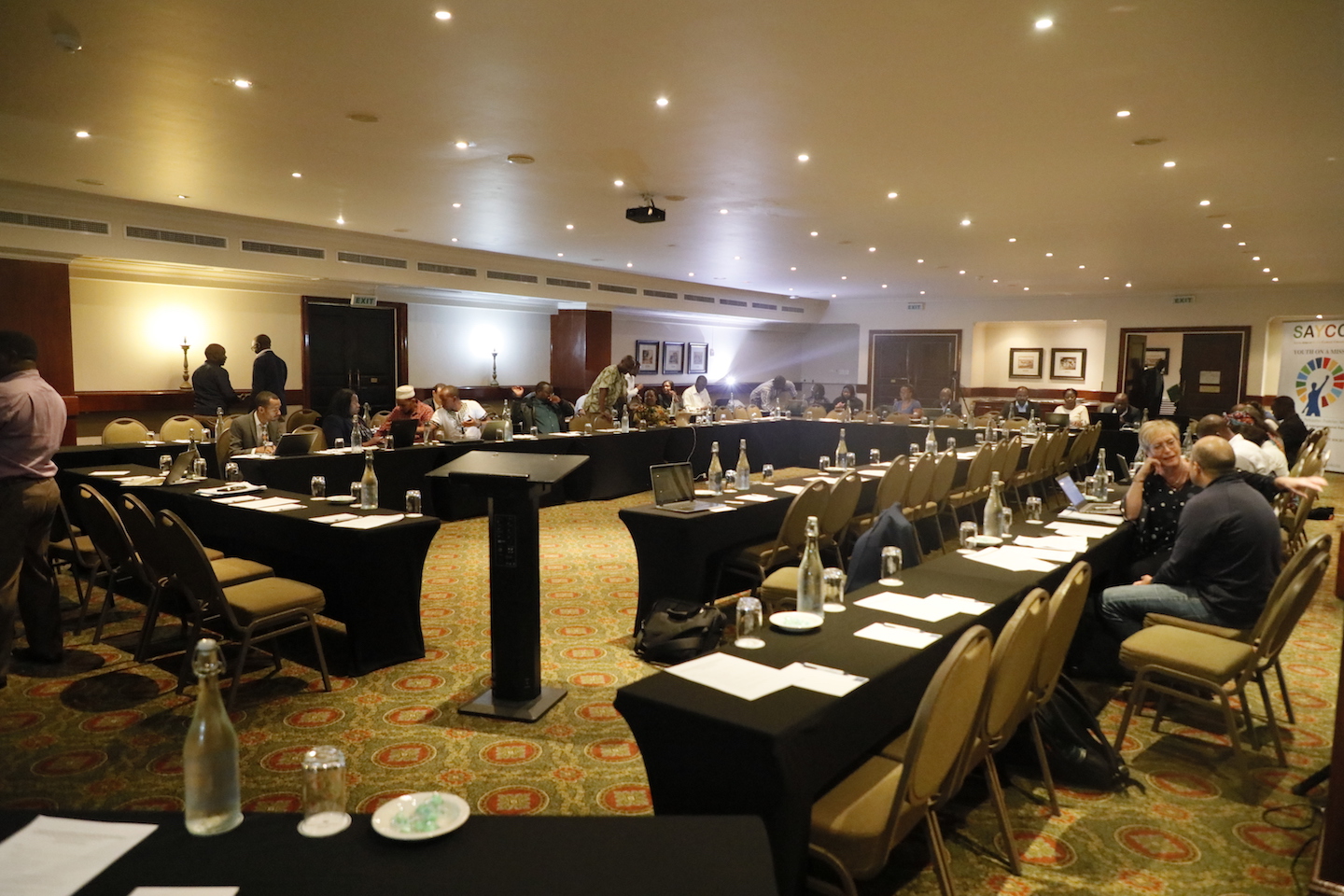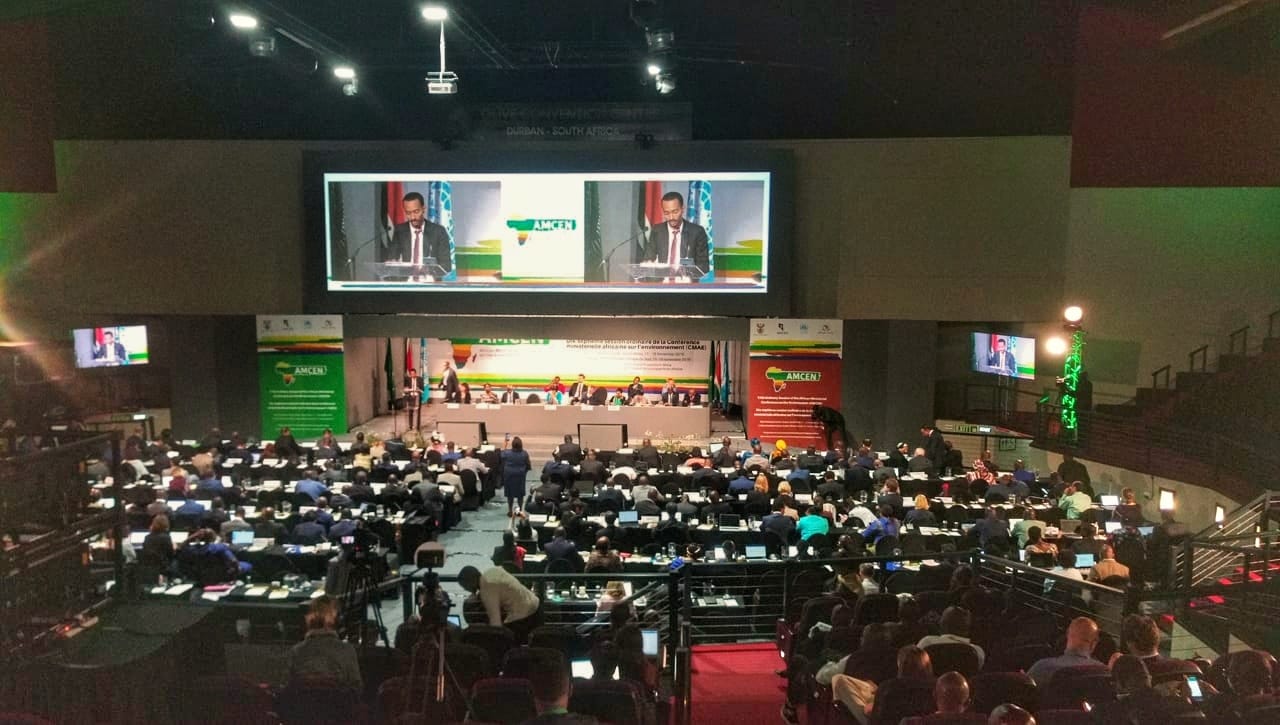Background
I attended the African Ministers Conference on the Environment (AMCEN), which was hosted by South Africa and held in Durban from 11 to 15 November. AMCEN was established in December 1985 following a conference of African Ministers of Environment which took place in Cairo, Egypt. Its mandate is to provide advocacy for environmental protection in Africa; to ensure that basic human needs are met adequately and in a sustainable manner; to ensure that social and economic development is realised at all levels; and to ensure that agricultural activities and practices meet the food security needs of the region.
This was the 17th session of AMCEN, and its theme was "Taking action for Environmental Sustainability and Prosperity in Africa". Its focus was on the need for African countries to take practical action, including implementation of policies, relevant regional and global frameworks, in order for the continent to attain environmental sustainability and prosperity and achieve the Sustainable Development Goals (SDGs) and Africa’s Agenda 2063.
AMCEN was broken down into two segments: an expert segment from 11-13th November, and a ministerial segment from 14-15th November. UN Environment organised a regional consultative meeting for Major Groups and Stakeholders (MGS) on 9 and 10th November, to prepare their positions and input for AMCEN.
Major Groups and Stakeholders (MGS)
The African MGS consultation meeting carried out a stock take of previous AMCEN decisions and actions from global forums and conferences.
We also discussed the theme for the next UN Environment Assembly (UNEA).
I chaired a working group session on the Key Issues under consideration at AMCEN. Here, four working groups focused on the key areas that AMCEN was considering in its agenda in order to form common African positions. These were:
- Promoting a circular economy in Africa;
- Climate change: towards COP25 and implementation of Nationally Determined Contributions (NDCs) in Africa;
- Promoting biodiversity economy and natural capital accounting in Africa; and
- Advancing the blue/ocean economy in Africa.
The positions developed in these working groups formed part of the final joint statement by African civil society that was subsequently presented to the AMCEN plenary. As only 3 minutes were allocated, a shorter statement was delivered verbally, and a longer statement provided for the minutes. This is the statement delivered verbally. Note that it included the following:
“Moreover, industrial agriculture and monoculture production systems are input-heavy and have multiple detrimental environmental impacts. Thus, we call upon our African governments to recommit to agro-ecological solutions which are regenerative by nature.”
The statement also berated the lack of adequate implementation of previous declarations and decisions of the AMCEN, the limited MGS participation in some working groups during the expert segment, and recommended that the Regional Consultative Meeting should be institutionalised as part of the AMCEN.
Expert Segment
This is the Agenda of the Expert Segment. This is a wider agenda than the Ministerial segment, also covering various environmental conventions, the next UNEA and its theme, etc…
Here is the Draft Report of Expert Segment. I was able to make a statement on the proposed theme of the fifth session of the Environment Assembly (see P17). This is also linked here.
Ministerial Segment
This is the Agenda of Ministerial Segment.
Here is the Draft Report of the Ministerial Segment.
Outcomes
There were two main outcomes from the AMCEN:
Neither of these were very earth-shattering! Just a few points from the latter:
- The commitment to involve non-state actors, such as the private sector, civil society, academia and development partners, in the implementation of the decisions of the Conference;
- The endorsement for establishing a core group to facilitate the coordination of the African group of negotiators in developing a common regional position for CBD post 2020 framework;
- The need for adequate provision of financial resources, access to technology and capacity enhancement commensurate with the level of ambition of the new post-2020 global biodiversity framework; and
- A request for the African Union Commission and partners to establish a platform for African negotiators on matters pertaining to the Convention on International Trade in Endangered Species of Wild Fauna and Flora (CITES) in order to foster a coherent African position and enable African countries to speak with a common voice in global negotiations.
N.B: The latter is quite worrying, as there are fears that this may be a move to foster support for reversals of CITES protections for endangered species.
Shocking
The meeting was shocking and annoying in equal measure! The aspects of most concern were:
- The emphasis throughout (as witnessed by the agenda) on using nature and animals for economic gain.
- The marked lack of implementation of previous AMCEN decisions and action points from global forums and conferences.
- The failure by so many member states to pay their pledges to the AMCEN Trust Fund, with unpaid pledges between 2010 and 2019 amounting to US$3,517,866. See here for more information.
- The way in which civil society was side-lined and excluded.
The severely curtailed civil society space was most concerning, and WAN is working with other civil society organisations to follow up on this. Whilst civil society was allowed to participate in general discussions on the working group issues, we were asked to leave two of the three working groups once drafts were being considered. In the third working group, civil society was allowed to remain in the room, but not to make any comments. Worse still, the “Omnibus Decision” which was being considered in these working groups had not even been amended to reflect working groups’ discussions when member states negotiated this behind closed doors.
This is not in line with usual procedure at UN and Conventions meetings. For example, the usual procedure at UN Environment Assemblies (UNEAs) is that civil society are permitted to attend sessions working on draft resolutions, and to offer general comments (but not to negotiate texts, as these are member state documents). Some meetings allow even greater participation.
It is extremely worrying that these moves to limit civil society space are coming from African countries. Many civil society organisations work on the ground to help to implement decisions made in AMCEN, UNEAs and environmental conventions, including providing funding. Indeed, it was particularly ironic that one section of the text considered by the only working group where civil society were permitted to remain in the room covered implementation support from civil society – and yet we were not even able to comment on this!
Civil society will not let this exclusion and side-lining continue. Or, worse still, carry over to other UN meetings and conventions.


